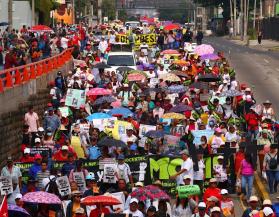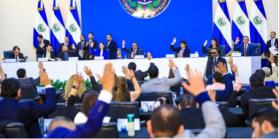Visit to ILEA by SOA Watch/CISPES
VISIT TO INTERNATIONAL LAW ACADEMY (ILEA) San Salvador
By SOAW/CISPES Delegation - March 21, 2007
Report written by Lisa Sullivan, SOAW Latin America Coordinator
Background on visit
InMarch 2007 a delegation of the School of Americas Watch visited ElSalvador as part of the SOAW Latin America initiative. El Salvador wasthe twelfth country visited by an SOAW delegation, part of a series ofvisits to all Latin American countries that are currently sendingstudents to the SOA. The goal of the initiative is to encouragegovernments to reconsider their participation at SOA and to engagelocal organizations in the campaign to close the school.
Priorto the visit to El Salvador, members of the delegation had heardnumerous concerns expressed about the new Latin American ILEA(International Law Enforcement Academy) which was recently establishedin San Salvador, both on our visits to other Latin American countriesand at speaking events in the U.S. Many had expressed concerns thatILEA might become the new face of the SOA in Latin America.
Duringour visits to these 12 Latin American countries, we found a commonthread of concern expressed by human rights groups which sharpened ourconcern for ILEA. This concern is directed at the increasinglyrepressive role of police forces throughout Latin America and the sharprise of human rights abuses on their part in many countries. Manycountries seem to be making real strides in reshaping the role of theirmilitary, often as part of peace accords agreed upon after civilconflict and military dictatorships. The role of the military duringthe 70s and 80s which targeted civilians as internal enemies isbeginning to shift, but increasingly, police forces are stepping intothis role. Often the reasons are justified by terms such as citizensecurity just one word off for the justification of militaryrepression in past decades, which was national security. Criminals,gangs and terrorists are the new target words used to replace termslike communists and subversives.
Likewise, the training,demeanor and even uniforms of police forces throughout Latin Americaare becoming much more military-like. For this reason, we were all themore interested in taking a closer look at this new initiative of theUS to train Latin American police forces.
Overview of ILEA
ILEAis a set of US-operated international law enforcement academies, aninitiative that was approved by Congress in November 1995. Four federalagencies were charged with overseeing this initiative:
* Department of State
* Department of Homeland Security
* Department of Justice
* Department of the Treasury
There are currently 5 ILEAs in existence:
* Eastern Europe Budapest(1995)
* Asia Bankok (1999)
* Africa Gaborne (2001)
* United States Roswell (2001)
* Latin America San Salvador (2005)
Involvement of IDHUCA with ILEA
Inspite of strong opposition by the human rights community in El Salvadorto hosting an ILEA in their country, one organization took a differentposition and agreed to accept an offer made by the U.S. government toteach human rights at the academy. This organization is IDHUCA Instituto de Derechos Humanos de la Universidad de Centro America,which is part of the Jesuit-run University of Central America. Werequested a meeting with IDHUCA in order to learn more about ILEA andto ask if they could arrange a visit to the academy itself.
Itshould be noted that IDHUCAs office is only a few yards from the siteof the 1989 murders of six Jesuits priests, their housekeeper and herdaughter, a massacre that was carried out by SOA graduates. This eventlater became the motivating force behind the creation of SOA Watch andthe annual vigils at the gates of Ft. Benning continue to be held onthe anniversary of this massacre. From the onset of the meeting withIDHUCA, we openly expressed our surprise and concern that a Jesuitorganization operating in the shadow of a massacre orchestrated byU.S.-trained soldiers would now become a justification to the operationof a new U.S. training initiative.
On March 20th we met with thedirector of IDHUCA, Benjamin Cuellar, and three other staff members whoare involved with the ILEA work. Dr. Cuellar told us that althoughIDHUCA was initially opposed to the establishment of ILEA in ElSalvador, they changed their position after the Salvadoran Congresssigned a midnight deal with the US government to approve the academy.The reason they gave for this switch was that there was a lack ofinternal political opposition to ILEA (in contrast to the situation inCosta Rica, which rejected a bid from the U.S. to establish the academyin their country). By accepting the U.S. embassys offer to teach humanrights at the academy, IDHUCA felt that they would have the opportunityto monitor its respect for human rights from within. They acknowledgethat this decision has been strongly criticized by the Salvadoran humanrights community and by political opposition forces (FMLN) in ElSalvador.
The IDHUCA staff informed us that the human rightscourse that they teach at ILEA is obligatory for all students. They aregiven complete freedom regarding how to teach this course. Theyrepeated many times over that although the ILEA is being targeted asthe new SOA, that they do not feel that this title is deserved, andthat ILEA teaches something that is needed in Latin America, which istechniques of investigation. Also, students are not limited to police,and sometimes local judges and members of the Justice Department havetaken courses. They also feel that the police department of El Salvadordoes a good job of respecting human rights and that recent conflictscan be explained by the need to maintain law and order. IDHUCA agreedto set up a visit for us to ILEA, and this was scheduled for thefollowing day.
Visit to ILEA
The following day, March 21,we visited the temporary headquarters of ILEA, which is the third floorof the National Police Academy. Several directors from the academy, theState Department and U.S. government were awaiting our visit, and wespent three hours both with a tour and in extensive conversations withthese individuals.
Tour
We were offered a guided touraround the facilities during a break from classes. We were specificallyasked not to film any students, or the names of students which were onplacards on each desk. We were shown one of two classrooms which wasspacious, had approximately 40 desks, several computers and quite a bitof audio-visual equipment. We were told that the second classroom wasvery similar, and were also shown a smaller discussion room. We werealso shown the offices of the academy. The entire third floor of thepolice academy functions as the ILEA. We saw about a dozen studentsdressed in matching police uniforms and boots who were apparentlytaking a break between classes.
Some of the issues discussed were the following:
Objectives
Accordingto its directors, the purpose of the ILEA is twofold. One purpose isthe training of police and law-enforcement personnel, and the otherpurpose is the interchange of information, and establishment ofrelationships between Latin American law enforcement agencies and theUnited States. Courses are set up to allow for a maximum of interchangeof information, and a strengthening of personal ties and relationships.
Anothermajor purpose of the ILEA, according to its directors, is to create asafe environment for the investment of U.S. businesses in LatinAmerica.
Students
When we asked if we could have accessto a list of graduates from the ILEA, we were told that this would beimpossible. The reason given was to protect the students fromperpetrators of organized crime. We expressed concerns that it wouldtherefore be difficult to monitor the human rights record of the schooland asked if we could at least have a list of the participatingcountries and the numbers of students from each country. They pointedto a list of participating countries in their booklet, but alsoacknowledged that not all of these countries had actually sentstudents. They made a commitment to get us this information, but threeweeks after this visit, we have not received this information.
Accordingto the directors, ILEA prefers to hand-pick its students, but the normsof countries vary, and this is not always possible. They look forstudents with the highest moral character and all are vetted by twodifferent processes. If they commit a crime after participating inILEA, they will not be eligible for another course.
ILEA is anacademy for law enforcement, and open to those involved in this generalarea. The majority of students are police, but there have been somestudents who are judges and prosecutors. The State Departmentrepresentative clearly indicated that ILEA is not closed to receivingstudents from the military, especially the military police. This iswhy, he indicated, the U.S. government turned down Costa Rica as apossible site, since Costa Rica made it clear that they would notaccept the training of military personal. (All other versions we hadpreviously heard were that it was Costa Ricas decision to turn downILEA).
Instructors
All instructors are from the U.S.Their background is related to law enforcement. Though none are activemilitary officers, some may have a connection with the National Guardand some may serve in the reserves.
Budget
We asked aboutthe budget and were told that it was a bit complicated and that exactstatistics were hard to determine. According to the directors, thebudget is divided among several U.S. entities, with the StateDepartment responsible for the largest share. The U.S. pays fortraining of students, their travel, hotel and food, and all expensesrelating to the teaching staff, and El Salvador is responsible for somestructural and building expenses. They offered a guess at the cost ofthe school at this current infant stage to be around $600,000. Weindicated that if indeed ILEA is training around 1,000 students peryear, this figure seems unreasonably low. They responded that exactfigures were hard to determine. They indicated that El Salvador hadmade minimal monetary contribution. (However, it should be noted thatan article in Co Latino on March 9th indicated that the Salvadorancongress had approved another 110 thousand dollars for ILEA.)
Thestaff also indicated that ILEA will have its own headquarters, and thatthis is a temporary location. Just recently, the government of ElSalvador designated a plot of land near a new commercial center whereILEA will build its academy.
Concerns
After reflecting on our visit, we would like to share the following concerns about ILEA which this visit has brought about:
* Given the shift of roles from military to police in controlling andrepressing the internal population in many of the 12 Latin Americancountries we visited, we are concerned about the new involvement of theUS in the training of Latin American police forces. While the LatinAmerican ILEA is only a year old and cannot fairly be called a new SOAbased on its outcome, the goals of the academy seem too reminiscent ofthose of the SOA.
* The refusal of ILEA to release the names oftheir students will make it impossible to monitor the human rightsrecords of their graduates.
* Lack of information regarding actualnumbers of students per year, actual statistics of participatingcountries, and numbers of students from each country per year will alsoinhibit this ability to monitor ILEAs human rights record. (Werequested this information and follow up was promised, yet three weekslater we have not received a response.)
* The exchange ofinformation and relationships between U.S. and Latin American securityforces was reminiscent of the SOAs role in the networking that was keyto the success of the Plan Condor.
* Although the focus of theschool is on police and others involved in law enforcement, thedirectors clearly stated that they are not closed to training militarypersonnel . Also, teaching staff may belong to military institutions.While the ILEA directors are very concerned about being targeted as anew SOA, their openness to training military makes it difficult to notmake the comparison.
* While the ILEA staff never expressed thesecurity of Latin American citizens as one of its objectives, it didstate that one major objective of the academy is that of creating asafer investment environment for U.S. business in Latin America
*We are very concerned about the involvement of IDHUCA at ILEA. Duringour meeting the staff used their participation as a shield to concernsabout human rights. We are concerned by the fact that IDHUCA receivesfunds from the U.S. government to teach at ILEA, making it difficultfor them to be neutral in monitoring of human rights of the academy.

 "I am a CISPES supporter because continuing to fight for social justice and a more people-centered country means continuing the dream and sacrifice of thousands of my fellow Salvadorans who died for that vision.” - Padre Carlos, New York City
"I am a CISPES supporter because continuing to fight for social justice and a more people-centered country means continuing the dream and sacrifice of thousands of my fellow Salvadorans who died for that vision.” - Padre Carlos, New York City

